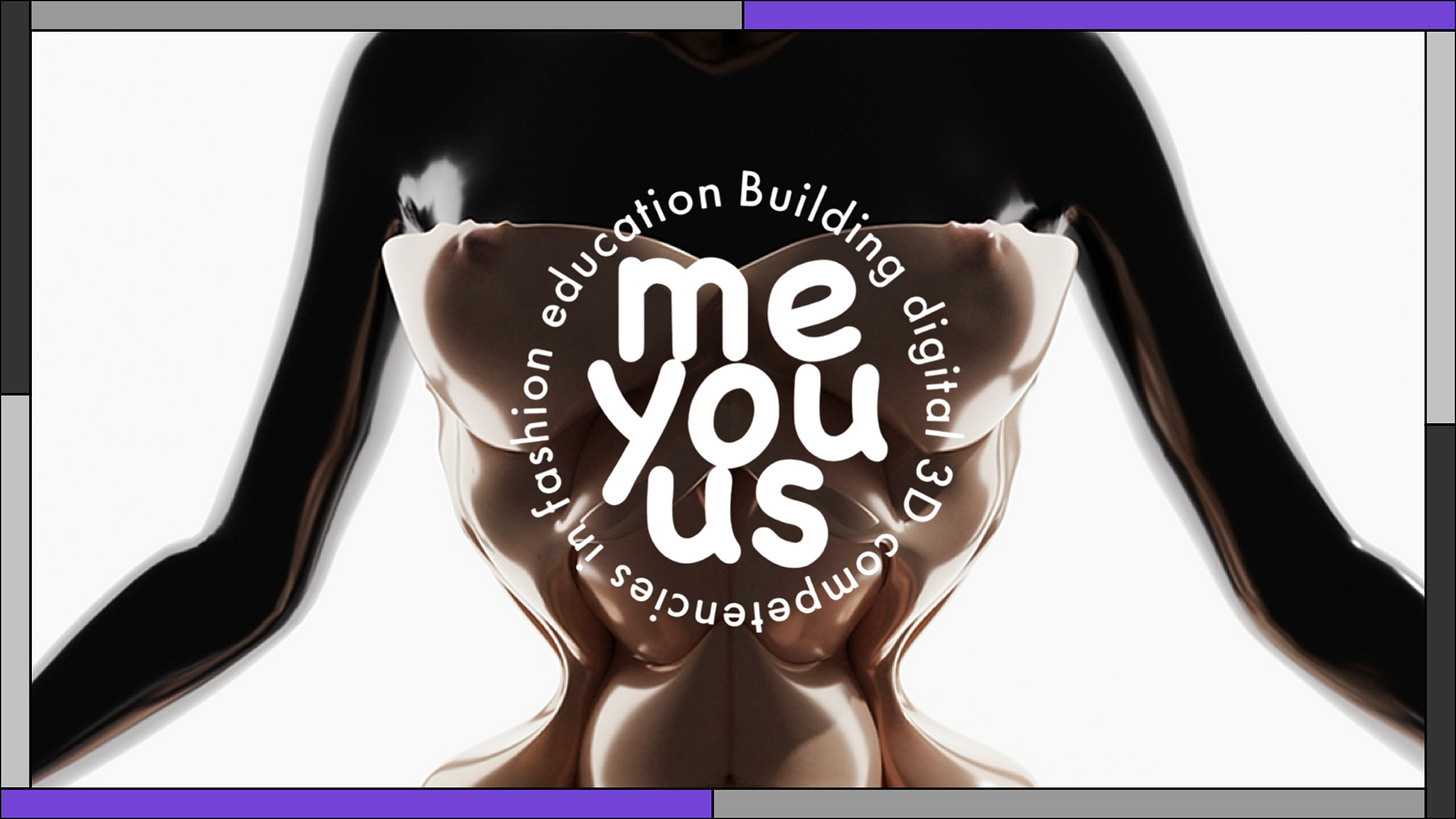Welcome to the Unfolding NEW PATTERNS. In my latest podcast, Fashion Knowledge, I discuss sculptural accessories, design innovation and advanced 3D technologies with PUBLISHED BY. Find out more on Instagram.
It's always tempting to speculate on the future of creative industries. The question of who will design your next bag is quickly followed by the more fear-saturated one: will there be any design jobs in fashion? Last month, I had the pleasure of delivering a keynote on the digital literacy and the future of fashion jobs for the team from the Me-You-Us project. This initiative is a collaboration between the Willem de Kooning Academy in Rotterdam, the University of Ljubljana, and the Design School Kolding. Funded by the EU, the project aims to integrate digital tools into fashion education to promote a green transition, inclusion, and diversity. Their goal is to develop an open-source library consisting of 9 modules for fashion educators, enabling them to incorporate digital tools into existing curricula. In my presentation, I emphasized the importance of critical thinking, highlighting the necessity of understanding not only how digital tools are used but also why, how, and, most importantly, what their impact is.

Are AI experts on the rise?
A quick flip through recent articles and foresight from big consulting groups reveals a new wave of jobs emerging. Each sector appears to require a dedicated AI expert. In design, AI Fashion Designers and Creative AI Collaborators may soon enter the workforce, generating new product options with AI. In retail, AI Customer Experience Designers could personalize the online consumer journey with AI, while Avatar Managers may coordinate AI-generated digital models for marketing and retail purposes. This pattern extends to marketing and content development, where AI is poised to accelerate content creation and introduce more granular methods of trend identification and consumer segmentation. Last but not least, professionals in organizational ethics and sustainability will need to monitor the ethical use of AI in their industries, potentially leading to the emergence of roles such as AI Ethics Officers and Specialists. While plausible, I can't help but wonder if hiring "AI experts" in every sector is truly necessary, or if we simply need to ensure that fashion workers possess a higher level of digital literacy. Moreover, should sustainability hires be the only ones tasked with ensuring ethical practices in AI implementation?
Designers leaping into the future
Instead of speculating on the future, I have chosen to highlight various practitioners who are already reshaping and innovating fashion with digital technologies. These designers, creative technologists, and strategists, adept at embracing complexity and emerging technologies, are already forging ahead by integrating blockchain, AI, and 3D into their work, exploring limitations, risks, and possibilities. For instance, Julie Point, the Fashion & Creative Director at Heuritech, a company specializing in trend forecasting with machine learning and data, brings a background in art history and fashion management to her role. When I met Julie in 2022, I asked her about her background in art history and its connection to her current work, which seemed quite distant to me. Analyzing old paintings and sculptures appeared far removed from the world of emerging technologies and fashion. To my surprise, she clarified that the essence of art history — examining evolving styles, forms, and patterns — is equally fundamental to her present pursuits in machine learning and fashion trends.

This interdisciplinary strength is also evident in Scarlett Yang's work. Scarlett, with a background in both innovation design engineering, and fashion design, seamlessly navigates between biomaterials, 3D fabrications, data visualization, and other fields. Similarly, Paula Kuhne and Stella Achenbach possess expertise not only in fashion and 3D design but also in blockchain technology and tokenomics. Conversely, there are practitioners who initially pursued computer engineering before transitioning into fashion, such as Costas Cazantzis, the Lead Creative Technologist at the Fashion Innovation Agency at the London College of Fashion, specializing in real-time cloth simulation, avatar design, and disseminating fashion within hybrid worlds.
The blueprint for digital literacy in fashion
After exploring the profiles of seven fashion technologists, a distinct skill set emerges, outlining the blueprint for digital literacy in fashion. Central to this is a technological proficiency, often self-directed, showcasing a zeal for exploring emerging technologies and methodologies. This technological prowess is complemented by a nuanced understanding of complex systems, enabling these individuals to navigate and mold the digital landscape within fashion with both analytical and strategic depth.
Their contributions reflect a blend of creativity and innovation, rooted in an interdisciplinary approach that combines different disciplines and marries the tactile and traditional with digital and tech. A dedication to sustainability and ethical practices is a recurring theme, underscoring an engagement with the broader impacts of technology on society and the environment.
Furthermore, these pioneers exhibit a commitment to community and knowledge-sharing, evident in their active participation in educational initiatives, public talks, and collaborative projects. This not only amplifies their impact but fosters a culture of continuous learning and open exchange within the fashion technology space.
These skills greatly contribute to digital literacy in fashion. However, upon deeper analysis, it became evident that certain conditions need to be fulfilled when developing them. What connects them all is that they were not only curious and aware of tech development, but they also had time and ability to access it. Most importantly, critical thinking connects them, as without it, they wouldn't be able to experiment, adapt, and envision plausible fashion futures they are currently immersed in.
In essence, let's embrace digital literacy as a practical necessity rather than a mere trend or buzzword. Let’s focus on growth and continuous learning instead of relying on temporary solutions, quick fixes, and so-called experts. By doing so, we lay the foundation for a more resilient, innovative, and responsible fashion sector — one that continues to evolve, avoiding the trap of becoming self-consuming like an ouroboros.






